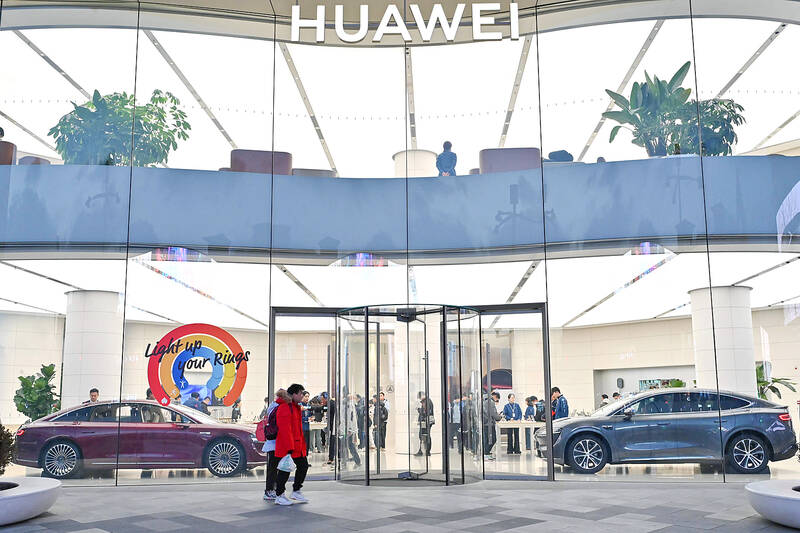Huawei Technologies Co (華為) will from next year strip its smartphones and tablets of Google’s open-source Android and move devices to homegrown software, broadcasting its ambitions to pivot away from US technology.
The company’s new flagship phone, the Mate 70, will debut HarmonyOS Next, the iteration of its operating system that does away with remnants of Android in favor of entirely indigenous tech. Announced at a live-streamed event yesterday, the new devices fuel Huawei’s campaign to reclaim China’s premium tier from Apple Inc and build an ecosystem without the involvement of major US tech providers.
Available on Wednesday next week, the Mate 70 and its Pro variants are the followup to Huawei’s most significant device in years, the Mate 60.

Photo: Adek Berry, AFP
Last year’s edition, powered by a made-in-China processor, brought Huawei back into the smartphone industry limelight and signaled its ability to work around US trade curbs designed to cut it off from the most advanced chipmaking.
HarmonyOS Next will still need another two to three months to improve the user experience, but the plan is to henceforth use it on upcoming gadgets, said Richard Yu (余承東), chairman of Huawei’s consumer business group.
The Mate 70 series will offer 40 percent better performance than its predecessor, in part because of HarmonyOS Next, Yu said, falling short of disclosing details of the processors that power the phones.
Shenzhen-based Huawei is expected to use its latest in-house Kirin chip for the new product line, though its performance increase may be less significant than Qualcomm Inc and MediaTek Inc’s (聯發科) top-end offerings, according to Bloomberg Intelligence analysts Charles Shum (沈明) and Sean Chen.
“That suggests the new Huawei phone may struggle to capture the attention of non-Huawei Android users,” they wrote.
Despite Washington’s blacklisting and technical challenges, Huawei managed to grow sales over the past seven quarters, with the help of an expanding smartphone business. Its shipments recorded four consecutive quarters of at least double-digit growth in China as of September, according to research firm International Data Corp.
Huawei yesterday also unveiled a number of other products including a new tablet and a gold-plated smartwatch. Earlier in the fall, the company introduced the world’s first trifold phone, also powered by chips that were designed in-house.

SEMICONDUCTOR SERVICES: A company executive said that Taiwanese firms must think about how to participate in global supply chains and lift their competitiveness Taiwan Semiconductor Manufacturing Co (TSMC, 台積電) yesterday said it expects to launch its first multifunctional service center in Pingtung County in the middle of 2027, in a bid to foster a resilient high-tech facility construction ecosystem. TSMC broached the idea of creating a center two or three years ago when it started building new manufacturing capacity in the US and Japan, the company said. The center, dubbed an “ecosystem park,” would assist local manufacturing facility construction partners to upgrade their capabilities and secure more deals from other global chipmakers such as Intel Corp, Micron Technology Inc and Infineon Technologies AG, TSMC said. It

NO BREAKTHROUGH? More substantial ‘deliverables,’ such as tariff reductions, would likely be saved for a meeting between Trump and Xi later this year, a trade expert said China launched two probes targeting the US semiconductor sector on Saturday ahead of talks between the two nations in Spain this week on trade, national security and the ownership of social media platform TikTok. China’s Ministry of Commerce announced an anti-dumping investigation into certain analog integrated circuits (ICs) imported from the US. The investigation is to target some commodity interface ICs and gate driver ICs, which are commonly made by US companies such as Texas Instruments Inc and ON Semiconductor Corp. The ministry also announced an anti-discrimination probe into US measures against China’s chip sector. US measures such as export curbs and tariffs

The US on Friday penalized two Chinese firms that acquired US chipmaking equipment for China’s top chipmaker, Semiconductor Manufacturing International Corp (SMIC, 中芯國際), including them among 32 entities that were added to the US Department of Commerce’s restricted trade list, a US government posting showed. Twenty-three of the 32 are in China. GMC Semiconductor Technology (Wuxi) Co (吉姆西半導體科技) and Jicun Semiconductor Technology (Shanghai) Co (吉存半導體科技) were placed on the list, formally known as the Entity List, for acquiring equipment for SMIC Northern Integrated Circuit Manufacturing (Beijing) Corp (中芯北方積體電路) and Semiconductor Manufacturing International (Beijing) Corp (中芯北京), the US Federal Register posting said. The

India’s ban of online money-based games could drive addicts to unregulated apps and offshore platforms that pose new financial and social risks, fantasy-sports gaming experts say. Indian Prime Minister Narendra Modi’s government banned real-money online games late last month, citing financial losses and addiction, leading to a shutdown of many apps offering paid fantasy cricket, rummy and poker games. “Many will move to offshore platforms, because of the addictive nature — they will find alternate means to get that dopamine hit,” said Viren Hemrajani, a Mumbai-based fantasy cricket analyst. “It [also] leads to fraud and scams, because everything is now